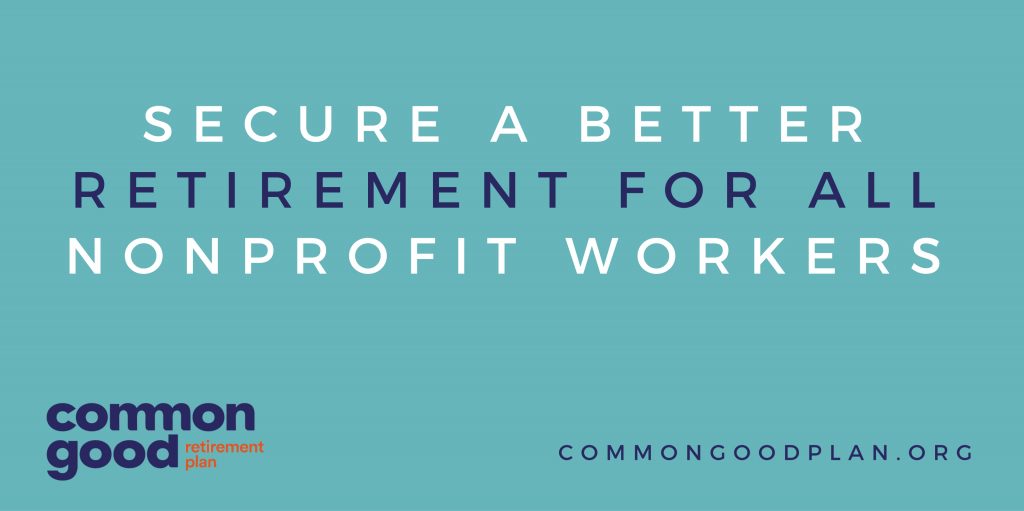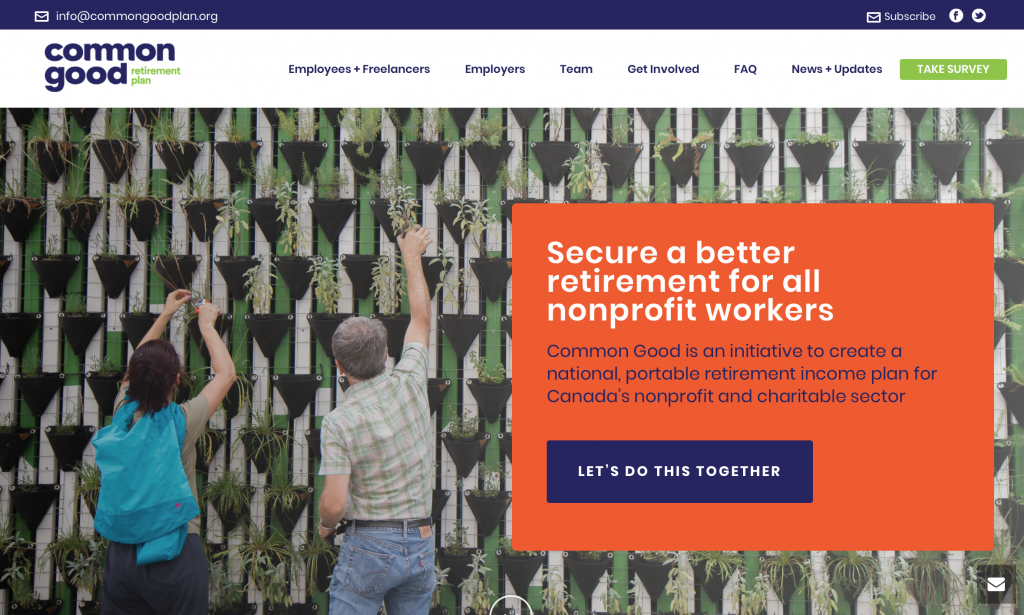
Leaders of Canada’s nonprofit and charitable sector
launch initiative for a first-of-its-kind
national, portable retirement income plan
May 31, 2018 (Toronto, ON) – With a steady decline in pension plan coverage outside of the public sector, building a secure retirement is increasingly an issue for workers. Canada’s nonprofit and charitable sector is taking a leadership role to address the retirement security challenge facing hundreds of thousands of its dedicated employees and freelancers – an effort it believes will strengthen the sector, combat economic inequality, and promote decent work. Some of the country’s most prominent nonprofit leaders, philanthropic foundations, and retirement security specialists are spearheading a new effort to create a national, portable retirement income plan for the sector. The Common Good Retirement Initiative is a first-of-its-kind opportunity to engage and consult the Canadian nonprofit sector about its collective needs, constraints, and attitudes on retirement saving. The aim is to offer nonprofit workers a convenient, low-cost and effective way to save for their retirement, as well as provide nonprofit employers an easy way to help their employees build long-term financial security.
- About 50% of the nonprofit sector (more than 850,000 people) does not have access to a workplace retirement plan, and many others are in low-quality, high-fee plans.
- Approximately 47% of the sector is employed in part-time or contract arrangements, compared to 12-18% of the broader economy. This growing population of nonprofit workers is often ineligible to join a workplace retirement plan.
- Many nonprofit employers, particularly smaller and mid-sized organizations, face barriers in offering a formal retirement program: cost, complexity, high member fees, administrative burden, potential financial liability, and the lack of low-cost, good options that put their workers’ interests first.
- Lower- and moderate-income workers in the sector face unique challenges in preparing for retirement, including potential clawbacks of their government benefits of 50% or more if they save using a traditional approach.

COMMON GOOD INITIATIVE
Tackling this retirement issue for a community as complex as the nonprofit sector requires a broad, collaborative effort that combines deep sector knowledge with retirement security expertise. The Common Good Retirement Initiative is proud to have the support of these forward-thinking leaders:
- Alan Broadbent (Chair), CEO, Avana Capital, and Chairman and Founder, Maytree
- Owen Charters, CEO, Boys & Girls Clubs of Canada
- Rahima Mamdani, Vice President, Human Capital, United Way Greater Toronto
- Elizabeth Mulholland, CEO, Prosper Canada
- Colette Murphy (Chair), Executive Director, Atkinson Foundation
- Alison Brewin, Executive Director, Vantage Point
- Peter Chapman, Executive Director, SHARE
- Adil Dhalla, Executive Director, Centre for Social Innovation
- Meghan Moore, CEO, Loran Scholars Foundation
- Lee Rose, Managing Director, Community Knowledge Exchange
- Paulette Senior, President & CEO, Canadian Women’s Foundation
- Richard Shillington, Social Policy Expert and Researcher
- John Stapleton, Innovation Fellow, Metcalf Foundation, and Principal, Open Policy Ontario
- Atkinson Foundation
- Hamilton Community Foundation
- Maytree
- Metcalf Foundation
The design and operations of Common Good would be provided in partnership with Common Wealth, a mission-driven retirement security firm that created the first retirement plan in Canada for lower- and moderate-income workers in collaboration with SEIU Healthcare, and whose team has decades of experience serving some of the country’s top public pension plans. The plan’s expert technical advisor is Keith Ambachtsheer, retirement security expert and Director Emeritus of the International Centre for Pension Management at the University of Toronto.

SECTOR ENGAGEMENT AND CONSULTATION
The website commongoodplan.org has been launched as part of the initiative to raise awareness and engage in a wide consultation process with the nonprofit sector.
To build the best possible retirement income plan, a national survey (available in French and English) has been developed with Pollara Strategic Insights – one of Canada’s leading polling firms – to better understand the nonprofit and charitable sector’s retirement needs and offerings. Nonprofit employers, workers (including part-time employees and freelancers), board members, and other leaders are being asked to complete the 5-10 minute survey at commongoodplan.org/survey.
The sector engagement process will take place over the next six months with a decision to be made in Fall 2018 on whether to move forward with implementation. If the initiative secures sufficient backing from employers and associations willing to offer the retirement plan, Common Good would be built and made available to the sector as early as 2019.
ONE STEP TOWARDS A BETTER RETIREMENT
The Common Good Retirement Plan would combine the principles of the world’s best pension plans with a more flexible design to reflect the needs of today’s nonprofit sector workforce. Governed by a board of directors with a fiduciary duty, the Plan would be based on the following principles:
- Accessibility: Available to freelance, part-time, and full-time nonprofit sector workers whose employers, associations, or unions sign up for the Plan
- Portability: Allows members to continue participating in the plan, even if they change jobs or employment status, relocate, or retire
- Affordability: Offers lower fees and professionally-curated investments structured to deliver the most retirement income for every dollar the member or employer contributes
- Flexibility: Employees’ contributions would be flexible, and employer contributions optional
- Inclusion: As a community-based plan, spouses and common-law partners would also be eligible to participate
TESTIMONIALS
Alison Brewin, Executive Director, Vantage Point
“Those who work for our sector commit to their communities, their art, their environment. While the organizations that employ them seek financial sustainability, the pressure to keep ‘administrative’ costs low is profound. Often this effort means limiting benefits others take for granted; investment in retirement plans is one area employers in the sector struggle to realize for their teams. The Common Good Retirement Initiative gives us an opportunity to offer sector employees yet another reason to stay in the sector, doing good work for good reasons. It is an important initiative that will benefit communities across the country. It is a pleasure to support it in anyway I can.”
Alan Broadbent, Chairman and Founder, Maytree
“People working in the community sector will have access to an effective and affordable retirement savings plan with the Common Good Retirement Plan. It is being designed by people with financial expertise who also understand the nonprofit and charitable sector, and the financial pressures its employees face. Common Good will provide people in the sector with a sound and viable retirement savings option that will make a comfortable retirement possible for many for the very first time.”
Peter Chapman, Executive Director, SHARE
“A simple, cost-effective and portable way to save for retirement is essential for the well-being of people serving in the non-profit sector and to the health of the sector as a whole. As non-profits struggle continually to do more with less, the Common Good Retirement Initiative is a shining example of positive innovation to address the non-profit retirement savings gap.”
Adil Dhalla, Executive Director, Centre for Social Innovation
“The success of our non-profit and charitable sector rests on its ability to recruit and retain talented people, and one of the biggest missing pieces to achieving this has been the absence of an affordable retirement savings plan. It’s a complex challenge but a worthwhile one, considering the collective impact of those who belong to this sector. We have a collective responsibility to care for those who take care of others, and I am excited to join the chorus for change.”
Rahima Mamdani, VP, Human Capital, United Way Greater Toronto
“Employees in the not-for-profit sector spend their careers working on behalf of others. With the Common Good Retirement Initiative, we have an opportunity to support them by filling an important need for a high quality, portable retirement plan. This innovative solution supports savings for sector employees at all income levels whether they currently have a retirement plan at work or not – and the plan has a legal duty to act in the best interests of its members. I believe this is an excellent model with the potential to make a real difference in the financial security of so many dedicated workers.”
Meghan Moore, CEO, Loran Scholars Foundation
“As a nonprofit employer of a small team, it is important to me to provide the best possible working environment for my employees. Motivating them to save for the future is a part of that. The Common Good Retirement Initiative will enable my organization to instil and support the habit of long-term financial planning by providing a higher quality, flexible plan for our employees with lower fees and less administrative burden for our organization.”
Elizabeth Mulholland, CEO, Prosper Canada
“Retirement savings are a critical dimension of financial health, but very few workers in Canada’s nonprofit sector have access to high quality retirement savings plans. That’s why I support the Common Good Retirement Initiative. The people who care for our communities every day deserve our support in return and access to an affordable, accessible and portable retirement savings plan that works for them.”
Lee Rose, Managing Director, Community Knowledge Exchange
“Why isn’t this a thing already? As someone who has worked in the social change sector for more than 10 years – I’m excited by the potential of the Common Good Retirement Plan to truly shift the way people like me think about saving for the future. With the changing nature of work – and indeed the changing nature of retirement – a gold-plated pension after 25 years of service with the same organization just isn’t in the cards for me. Adaptive. Flexible. Nimble. We all agree that these are valuable traits of people driving social change. I think they can and should also apply to how people like me can better save for the future.”
Richard Shillington, Social Policy Expert & Researcher
“Canada’s nonprofit sector labour force is not well-served by the current retirement support system (RRSPs / traditional pension). This is because they are often lower-income or part-time workers with higher turnover rates. GIS claws back their pension, CPP and RRSP benefits. That’s why I support the Common Good Retirement Initiative, which uses savings instruments designed to work better for this population.”
John Stapleton, Innovation Fellow, Metcalf Foundation, and Principal, Open Policy Ontario
“Low salaries are not uncommon in the nonprofit world, so it is important that these workers are given the support to start saving for their retirement. Through my work with low-income earners, I know firsthand the challenges they face in securing their financial future. The Common Good Retirement Plan would not only help these individuals preserve their government retirement benefits, but also assist the nonprofit sector in providing a high-quality retirement plan to its dedicated workforce.”
For further information or to arrange interviews, please contact:
Janette Luu, Communications
info@www.commongoodplan.ca


No comment yet, add your voice below!